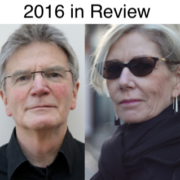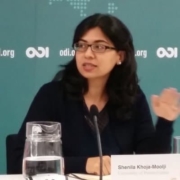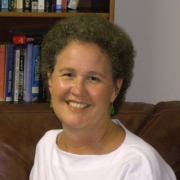Chris Sowton
Teaching in Challenging Times
Today we explore how teachers navigate their practice in challenging circumstances. My guest is Chris Sowton. Chris works in the field of English Language Teaching and International Education and has conducted teacher training and educational research in many countries, including Lebanon, Jordan, Palestine, Nigeria, Nepal, India, Somaliland, and Indonesia. He’s interested in the small-p politics of teaching.
Chris Sowton’s new book is Teaching in Challenging Circumstances, which was published by Cambridge University Press.
Citation: Sowton, Chris interview with Will Brehm, FreshEd, 270, podcast audio, February 21, 2022.https://freshedpodcast.com/sowton
Will Brehm 1:08
Chris Sowton, welcome to FreshEd.
Chris Sowton 1:09
Thanks, Will. Good to be here.
Will Brehm 1:10
Can you tell me, or describe some of the difficulties that a teacher might face when she or he is teaching students who are multilingual?
Chris Sowton 1:21
I think it’s an interesting question that you ask straight away, Will, that we see multilingualism as a problem, and it’s often framed in this kind of way. And I think that’s one of the challenges of working multilingual situations, that we see students who speak lots of languages as being a problem rather than as a resource. You know, in many poorer communities around the world, languages are one of the biggest and brightest resources they have. So, I think there’s an issue there already. And we see some of those problems in things like language of instruction policies around the world where even though there is clear, evidential research that students learn best when they learn in a language that they speak, or speak to some degree, so many students are marginalized throughout the world by not being able to access education in one of those languages. 10 years ago, Carol Benson and Stephen Walters, in an academic article, estimated around 40% of children didn’t learn in their first language. I don’t know what the data is now but I’m sure it’s even higher than that 40% figure. So, yeah, languages of instruction, if students can’t learn in a language which they know, then the gap between the educational haves and have-nots is just going to grow exponentially. And I think it’s particularly challenging in formal education systems where assessment is so important. It’s one thing to not learn in a language that you speak. But it’s quite another thing to be assessed in that way. Especially when exams etc. are so high stakes. So, this leads to issues of things like epistemic justice. And how can students fairly acquire the knowledge, or the skills, or the abilities, or the competencies they need in order to lead the good life?
Will Brehm 3:08
I mean, so in a way, there are those challenges for the student. But you also are saying that there’s great value, like we might actually frame this issue differently. Having a multilingual student body in the classroom is actually beneficial. What are some of those benefits?
Chris Sowton 3:23
So, for example, my background, my kind of, where I work is in English language teaching. And when you see students who are -there’s a thing called “safe talk”. So, when they don’t want to push themselves, or when they don’t have the linguistic resources to go beyond a certain level, they will restrict themselves to only saying certain things or things that they’re comfortable with. If we allow more languages within the classroom -so, for example, if we allow more multilingual practices like trans-languaging, or code-switching then we’re encouraging and empowering students to use those languages as a resource, and to talk about the things that they want to do. It also, I think, from the teaching side, can open up a whole load of other things as well. So, many teachers also -one of the reasons we see in so many challenging circumstances, why we see teacher-centered models, you know, a transmissive model of teaching is because the teachers themselves don’t feel comfortable in the language of instruction. It might be their second, or third, or fourth language that they are using in order to teach. And so, it’s no surprise that they restrict themselves, or they use drilling, and memorization, and these sorts of techniques rather than a more learner-centered pedagogy.
Will Brehm 4:40
In certain countries that are multilingual across diverse population, do governments allow teaching in different languages that is more conducive to learning in that particular environment? Like are there policies that allow multiple languages to operate simultaneously within an education system?
Chris Sowton 5:00
Yeah, the language policy picture is very mixed around the world. There are some examples where teaching is allowed in multiple languages, more of the primary level. And then maybe as they go to the secondary level, it becomes more restricted to national languages or more dominant languages. And then similarly to tertiary level, it’s sort of a narrowing pyramid over the way where you end up with, often, English at the top of that pyramid. But you often find those dominant languages throughout. And I think that’s one of the challenges of language policy is that it is so closely linked to the politics of it. And language is a very, very political device. And the choice of language for education is seen in those political terms. And I think that’s especially important in many areas where there are very few public services. In many poorer parts of the world, the primary school is the only public-facing institution in that area, and so it can become political football between the dominant groups in that area. So, you see, for example, school governance boards are not decided by who is the best or most appropriate person to support that school, it’s who the dominant political forces are in that particular area. So, I think that’s one of the challenges, but the whole time children are missing out on the only chance that they’re going to get of education because of the language policy choices which are being made.
Will Brehm 6:22
And the person in between those policies and the student is the teacher. How do teachers begin, or might begin, to navigate some of these politics that you’re explaining?
Chris Sowton 6:32
I think that’s one of the big challenges. You know, teachers do have to navigate this, and it is difficult. And the problem is often that they are making pedagogic choices because of political issues. And that can’t be right. That can’t be right that the choices they make in the classroom. The choices they make in the classroom should be dictated by what is best for those children who are in front of them on that particular day. What’s going to maximize their learning experience and maximize their learning outcomes? It shouldn’t be because of the political influences or the perception of that particular language in that area. You see this, for example, in Rwanda, a very particular political history. There, the language of instruction has shifted between French, and English, and all sorts of other language, Kinyarwanda was in there for some time. So, it is a very confused picture, and it changes on a regular basis. And so, for teachers, it’s extremely hard to know how to react or how to respond to that. A part of the problem is sometimes the language-of-instruction decisions are made without thinking of the resources there are in the country. So, in Rwanda, when they shifted to English a few years ago, it was clear that most Rwandan teachers had very, very low levels of English and would not be able to teach effectively in that language. We see something similar happening in South Sudan where English is the official language of instruction there. And you know, as the world’s newest nation state, that was the choice that was made, again, for political reasons. It wants to position itself as a modern, forward-looking state and because of the history of Arabic language of instruction in that particular country. So, for the teacher at the classroom level, it’s a very, very difficult picture. And so often, it’s caused by this political interference.
Will Brehm 8:20
And so, what advice would you give to a teacher who, in Rwanda or South Sudan, who all of a sudden is sort of told you have to teach your content -it could be whatever subject- in English. And yet your English skills aren’t that good, or you’re not that confident teaching in a foreign language. What advice would you give that teacher?
Chris Sowton 8:39
I mean, again, it’s difficult because what I’m able to say now, from my position, sitting in the UK, and looking at this objectively, is potentially very different from what a teacher in that classroom who understands the local context is able to do. But I still think in many, many situations, teachers do have that influence on their classroom. What happens within those four walls, it can be dictated by the teacher. So, there are micro-resistances that teachers can do. They can allow students to translate for each other, for example. I’ve seen it myself, even in areas where English is supposed to be the language of instruction, local languages are commonly used there in order to do that. So, it does happen. Teachers can do things, but it can be a risk for them to do that in certain situations. It can be a political risk or risks to themselves if they make those decisions because language is so closely allied to political decisions. And it may be that you are thought to be from a particular political group if you choose to use that language as a language of instruction against the official policy.
Will Brehm 9:50
I guess this is a slightly different question but why is it that English is seen at the top of that hierarchy that you were explaining earlier? Why is it that the newest nation state, South Sudan, has decided that English should be the national language despite that country, or that part of the world having a very different sort of tradition of language.
Chris Sowton 10:11
I think there’s a range of reasons for that. But I think the dominant one is that English is seen as the ticket to success. English is seen as a way of advancing yourself and your family, and getting a secure and decent job. I think that fundamentally underlies why that happens. And I think you see that a lot with -so, what we haven’t talked about is the rise of low-cost private schools, for example, in much of sub-Saharan Africa, where almost exclusively they use English as the medium of instruction there even from, you know, age of 4,5, 6, or whatever it may be. It’s almost seen as acquiring English is the most important thing that an education can provide. And it’s not even clear if that is for practical reasons, or whether it’s just as English as a position or good. If you’re able to speak English, then you can be part of the club. You can get these particular jobs. So, it seems like a way of maneuvering into those sorts of situations. So, I mean, I think that is what is deeply sort of underlying that principle.
Will Brehm 11:20
As I guess political economies change in these different countries. And I’m thinking here of, say, the Belt and Road Initiative by China, which is putting a huge amount of investment in countries across the world pretty much. Do you see the sort of desire for different languages changing, or even potentially language policies changing to, in this case, focus a little bit more on Mandarin rather than English because learning Mandarin might actually be a better ticket to a job?
Chris Sowton 11:48
I think, certainly, there will be probably an increase in seeing Chinese as an additional language and learning it there. I’m not sure I see it as entering into a language of instruction so much, certainly not for a long time. I think still, so many policies in so much of the world are still influenced by their colonial histories. You know, the English and the French, in some cases, Portuguese, Spanish, etc. etc. So, I think that we’re still in that sort of late post-colonialism where those languages still are the languages of the elite in many of those particular countries. At the moment, that doesn’t feel the same with Chinese, but you know, if we’re still hear in 50 years, Will, and FreshEd is still going, then we can revisit that.
Will Brehm 12:30
So, your book is called Teaching in Challenging Circumstances. And when I started reading it, the first thought I had was about COVID-19 because we’re still going through it. Teaching has been completely upended over these last two plus years for pretty much everybody from all levels of schooling. It certainly has upended my teaching at higher education. So, what would you say in terms of teachers who are having to navigate this really complex situation? What tips do you give that teacher? Like, how does the teacher continue to teach well in the pandemic?
Chris Sowton 13:08
It’s really, really hard. I think, at the time of speaking in February 2022, we see in many parts of the world, children going back into school, or having recently gone back into face-to-face teaching. I think it’s really difficult. There’s been huge gaps in education, children are out of the habit of that, some children haven’t ever been to formal education. So, there’s all these sorts of challenges that teachers again, are having to face. And teachers are, again, responsible for trying to sort out these challenges. And I think that’s one of the big challenges for teachers themselves and teachers who I work with, is that so much is expected of them. They’re expected to wear so many different hats to manage children back into school, to deal with their trauma. They’re at the front end of these political, and social, and cultural issues. But they’re also expected to somehow teach and teach particular subjects, and all sorts of things. So, there’s so many challenges that teachers themselves face in that situation. In terms of what they can try and do, I think one important thing is to try and present the classroom as a safe space. You know, students have had so many challenges, education has been so hard, they may have negative views of education, or they may have no views of education because of what’s happening in recent times. And so, it’s important that teachers try and create a safe space in that class. A place where they can trust the teacher, they can trust the other students. I think that’s a really important thing and it actually links back to what we’re talking about with language of instruction as well and I think all these things are sort of tied up together. If we have some students going into school having not been there for 18 months, two years, and now have to be taught in a language which they don’t know, which is a language of another group that they don’t know, that can feel like an unsafe space. It can actually create negative feelings towards education. So, you know, again, I think language of instruction does underpin so many of these issues.
Will Brehm 15:14
And it’s quite interesting that -at least in the media- the discourses around this idea of learning loss, and it’s a negative sort of connotation. And I could imagine being a teacher and feeling incredibly stressed that everyone assumes there’s been this learning loss and now it’s on you to fill the gap, and then build on that, and hopefully have learning games going forward. I mean, that must be so much pressure.
Chris Sowton 15:40
To me, the idea of, you know, we see in many parts of the world ideas of accelerated learning, and all these sorts of things but I always feel, when I see the words accelerated learning, it feels a bit like a sort of snake oil situation. You know, if we can accelerate learning at will, why didn’t we do it before? It doesn’t seem to make sense to me. I would also, again, question the premise of that. There’s a fantastic educationalist called Stephen Heppell and he talks about the last year, about the COVID generation being a golden generation because they have learned so much in that time. So many different skills that they wouldn’t have had the opportunity to acquire at any other point. And some of the relationships they’ve had with other people, some of the things they’ve learned online, not just with their parents, all sorts of things that they’ve learned and done differently -resilience, independence, confidence. All those sorts of things, those sort of soft, 21st century skills, whatever we want to call them. So, he makes a very persuasive argument, I think about that. They haven’t been in face-to-face formal education, but they have been learning. And again, I think that’s important to differentiate those two things.
Will Brehm 16:46
I think that’s right. And you know, that’s why that discourse around learning loss is so narrow sighted. It doesn’t see all of those other spaces of learning that exist always outside of formal schooling, right? Formal schooling is just one small site of learnings. Children learn everywhere in the world.
Chris Sowton 17:04
Exactly. But I think those two have become synonymous, really -formal learning and learning. But as you say, it’s not the same and in many parts of the world, they are very, very different. But I think that’s one of the challenges, formal learning is still seen as the most important kind of learning wherever you may be. And maybe the impact of COVID gives us an opportunity to take stock of that and see it in a different light.
Will Brehm 17:29
Another thing that COVID has really sort of taught us is the value of schools in communities. You know, in some places, like you said, the school is the only public facing institution. Even in the UK, where we live, schools fed so many children. And when they closed, people all of a sudden realized how valuable school was beyond that formal learning. And of course, teachers are sort of at the center of this as well, right? They are this sort of linchpin between and among community members in many ways because those interactions happen inside schools and through school. In this COVID period, how can teachers support and build some of these school-community interconnections that we now realize are so valuable?
Chris Sowton 18:19
First thing I would say is, I think it’s a damning incitement of the political process and governance in this country that it took a crisis like this to recognize that schools were feeding children and they were the main source of food. But I say that because I think it’s an important point that schools shouldn’t be replacing those sorts of functions of government, you know? Schools are crucial. They are primarily places for learning and for the dissemination and the sharing of information. They shouldn’t become one size fits all kind of centers for all these sorts of social problems. You know, we see it now with things like mental health services and stuff are being led primarily often by teachers or other school practitioners. Schools obviously have a role to play in those sorts of social issues, but they shouldn’t be the leaders on that. Specialty services are needed. And again, it comes back to this point: teachers are fantastic. They do so much. They cannot feed children, they cannot be the social services, they cannot be the frontline for all of these different things. So, absolutely, schools should be the center of communities, but they shouldn’t be replacing those other functions of the body politic in those communities.
Will Brehm 19:38
Yeah, I totally agree. I mean, a biology teacher in high school shouldn’t be the one that the community relies on to provide mental health services to children in that community or feeding children because there’s high rates of poverty and larger underlying issues that need to be resolved. But unfortunately, in the meantime, it does fall on teachers, right? I mean that is what’s happening.
Chris Sowton 20:01
Exactly. And that’s the problem. The problem is that teachers will do that because teachers do see it as a vocation. But that is no way to run an education system. There’s a quotation I use in my book by Alicia Ferguson Garcia, and she says, “I was blindsided by the emotional aspect of teaching. I didn’t know how to handle it. I was hurt by my students’ pain, and it was hard for me to leave that behind when I went home”. And I think lots of teachers feel very, very similar. But in terms of the long-term sustainability of the system, long-term teachers’ mental health and emotional well-being this is not sustainable. This is going to come crashing down. We already see it in this country, in many countries, where teachers are leaving the profession for these reasons. Because it’s just very, very hard.
Will Brehm 20:51
You worked sort of all around the world, with different teachers in challenging circumstances. What do we know about the mental health and the pressure and stress that teachers have faced during COVID? And how are some teachers responding? You know, with some of the examples of countries where you work, what do we know?
Chris Sowton 21:08
Again, not to be difficult Will, but I kind of question the idea of the mental health because in many countries where I’ve worked, things like mental health are not really seen, or they’re not really understood, or they’re not understood in the same ways as we would understand them, say, in the West. But certainly, what I do see is stress. Teachers are having to manage a lot of different stuff and yet some manage it well, some mask it and get on with it, and some don’t deal with it well at all. I think that’s fairly typical, kind of, around the world. I’m not sure it’s necessarily country specific. But what I would say in challenging circumstances is the teachers are having to deal with those issues but without secure work contracts, where they’re not paid on time, where they’re not allowed to join a trades union, where they haven’t got any of these other protections. So, they’ve got the similar stresses and anxieties that teachers elsewhere have but they don’t have any of those additional supports. And I think that is what can be harder for them in order to manage. And again, I think in many -I’ve worked, for example, with Syrian refugee teachers in Lebanon and what you see often is the impact of things like vicarious trauma, where they are trying to be so supportive to their students, and hear their stories, and they know about their lives, and they somehow take on that trauma from the children themselves whilst trying to manage their own issues, at the same time, their own post-traumatic issues as well. And again, it’s weighing all these things on top of teachers one by one by one by one. And, yeah, at some point, some people break, some people are resilient, but it doesn’t make for the best learning environments.
Will Brehm 22:56
Yeah, I would imagine. It’s a bad system, like you said, and teacher working conditions, or student learning conditions won’t be good results in the end. In the different contexts that you know well, has the pandemic sort of created any positive changes or benefits to schooling and teaching that you’ve seen?
Chris Sowton 23:14
I think it’s hard to say at the moment because we’re still sort of emerging out of it. I mean, I think there are certainly opportunities. I think COVID 19 does present opportunities to perhaps reimagine education systems and to see schools in different ways. And perhaps there’s opportunities for the community and schools to link together but in a more positive way- where people in the community don’t feel afraid about going into school or looking at how we can access some of those positive aspects of the local community, where people come in and share their oral histories about the local area, or talk about their profession, or where we can recruit more teaching assistants who can speak the local languages in order to support children in the classroom. I think there is an opportunity to reimagine the school for after all this and not be so driven by formal assessment processes and all these sorts of things. I think there is an opportunity to do that. But I do worry that won’t be followed through with. That we will just resort to type and we’ll talk about accelerated learning, and the importance of high stakes exams, and all the rest of it. I do worry that there could be a narrowing of this. I think we are at an important point in that process.
Will Brehm 24:25
Going back to this -I guess the underlying idea here is about the role of teachers and the politics that teachers sort of navigate on a daily every day basis in the classroom but also within the communities. And of course, managing huge external events like COVID-19 that has just upended everything. So, navigating these politics, what does this tell us about quality education since the sustainable development goals in 2015 made a very big proclamation saying that we need to achieve quality education and inclusive education by 2030. How do you see that goal in relation to these sorts of “small p” politics that those teachers are navigating?
Chris Sowton 25:08
Yeah, I think we take it just a step back to think about the Millennium Development Goals and what they were trying to do. I think one of the positives of the Millennium Development Goals is that they did get more kids into school. But it was, to my mind, largely a quantitative measure. The problem with it was that I think a lot of the things that go along with that were not done. The good quality teacher training, all those sorts of things, better textbooks that better represent the people who are going to use them. All those sorts of issues were not done. And also, I don’t think the Sustainable Development Goals addresses that in a meaningful way either, certainly not to the extent to which is needed. Again, just to give you an example, language is barely mentioned anywhere in the Sustainable Development Goals. I think it’s in one optional thematic indicator. And I think it partly is because of the way that these goals are agreed upon by all the member-states of the United Nations. You know, language is such a political issue that it’s easier to ignore or sideline rather than address. But the impact of that can have on systems is huge, as we’ve talked about today. So, I think, yeah, the SDGs are, of course, laudable and everyone will agree with them but in terms of the actual impact that they’re going to have on a classroom, in Burkina Faso or in Laos, or wherever it may be, I’m not so sure.
Will Brehm 26:30
Chris Sowton, thank you so much for joining FreshEd. It really was a pleasure to talk to you. Thanks.
Chris Sowton 26:34
It was great to be here.
Want to help translate this show? Please contact info@freshedpodcast.com
Have any useful resources related to this show? Please send them to info@freshedpodcast.com









